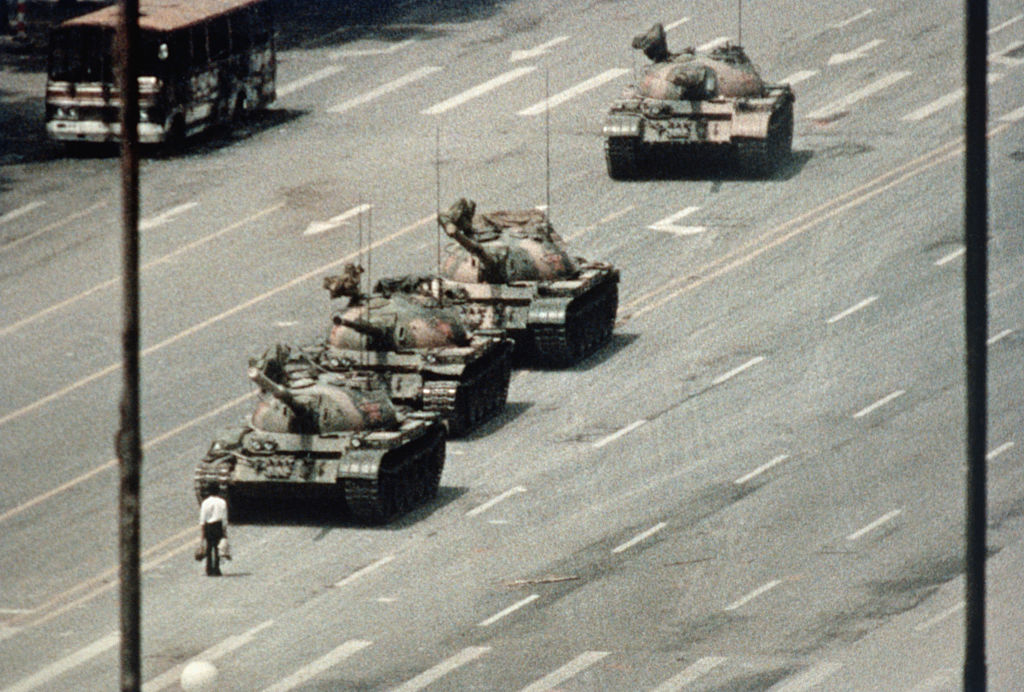Remembering Tiananmen as Ukraine fights for democracy

Today marks the grim milestones of 100 days since Russia invaded Ukraine and 33 years since the People’s Liberation Army massacred students in Tiananmen Square in Beijing. We must support the Ukrainian people as they fight for their freedom. But we shouldn’t forget how the Chinese Communist Party suppresses any hope of democracy for the Chinese people.
Early in Russia’s invasion, scenes of Ukrainian civilians attempting to block Russian tanks drew comparisons to the anonymous ‘tank man’ in Tiananmen Square, including from US President Joe Biden. Beyond the ugly spectacle, we must understand why Tiananmen still shapes the dictators’ playbook.
To learn from Tiananmen, we must first remember.
As George Orwell foretold, ‘history has stopped’ in the People’s Republic of China. Officially recorded as a ‘counterrevolutionary rebellion’, systematic censorship means young Chinese have scant grasp of what happened on 4 June 1989. The Chinese authorities suppress any expression of remembrance. This includes the annual candlelight vigil in Hong Kong, banned since new national security powers were imposed in 2020.
Outside the PRC, remembrance is patchy at best. The Chinese diaspora and human rights groups are organising events in cities around the world, including in Australia. Many people will post a picture of a candle or similar symbol online, including some Western diplomats and politicians. But outside the US and Taiwan, our leaders and ministers are unlikely to speak out unless pressed by the media, fearing Chinese blowback.
But the CCP has not forgotten Tiananmen.
The experience of divided leadership, unreliable security forces and a mass social movement openly challenging CCP legitimacy in front of the assembled world media shocked the party to its core. The shock was amplified by events in Europe—the fall of the Berlin Wall and collapse of Soviet empire in Eastern Europe months later, leading to the dissolution of the USSR in 1991.
Learning from this experience, the CCP implemented domestic and international measures to ensure it could never be similarly threatened. Rival sources of power would be identified and nipped in the bud through a range of subtler, more effective means than martial law, bullets and tanks. This turbocharged CCP efforts to develop a smarter, more pervasive and effective system for the surveillance and manipulation of public opinion, which extends overseas. Foreign journalists were restricted or expelled, and poisonous foreign ideas held beyond the ‘great firewall’.
A more reliable pool of CCP enforcers was also required. This led the paramilitary People’s Armed Police to be comprehensively overhauled and expanded. It was removed from the police bureaucracy to more direct command by the top of the party. The PAP is now a key institution for internal security, including suppression in Xinjiang. It also has diplomatic duties and provides means for Chinese security interventions overseas, potentially including in Solomon Islands.
Tiananmen also showed the CCP that it needed to improve its influence overseas and reshape the multilateral system to its ends.
As Professor Rosemary Foot and others have documented, China was surprised by its censure in UN bodies and moved to regain the discursive offensive. China published a white paper on human rights in 1991, translated into multiple languages. This would be the first in a long series of turgid and soporific tomes spruiking China’s distorted vision of human rights which eschews universal values and emphasises development and ‘non-interference’ in a direct appeal to non-Western countries. Sadly, China’s white-anting of UN institutions appears to be working—UN High Commissioner for Human Rights Michelle Bachelet’s visit to Xinjiang last month raised concerns of a Chinese whitewash of its abuses in the region.
Post-Tiananmen, China has been able to exploit Western division, greed and trade-offs between human rights and strategic priorities.
Given mutual opposition to the Soviets, President George H.W. Bush was reticent to isolate China and opposed congressional pressure for a firmer response. But lobbied by US business interests, even Congress baulked at fully revoking China’s trade privileges. As we’ve seen with recent hostage diplomacy, Beijing played a shrewd game—timing concessions like the release of detained Tiananmen protesters to coincide with congressional votes.
Western fatigue soon set in. Henry Kissinger—who recently suggested Ukraine should cede territory to Russia—was among those who flew to Beijing after the massacre to reassure the politburo that Sino-American rapprochement remained the overall priority. The Japanese and others took the hint, and most Western sanctions were relatively short-lived. The need for China’s vote as a permanent member of the UN Security Council after Iraq invaded Kuwait in 1990 diminished any remaining resolve to punish Beijing.
Australia tracked a similar trajectory to its Western partners. Prime Minister Bob Hawke had spearheaded economic engagement with China in the 1980s. Hawke’s tears and offer of asylum to more than 40,000 Chinese nationals reflected his genuine sense of betrayal at what had happened in Tiananmen. But Hawke and Australia soon moved on, and bilateral trade grew steadily in the 1990s.
Which brings us back to the present and Ukraine.
Learning the lessons of Tiananmen is an urgent priority as we confront the ‘no limits’ friendship announced between Vladimir Putin and Xi Jinping in February. While experts debate the depth of practical Sino-Russian cooperation, their militaries join forces in the Indo-Pacific and CCP propagandists amplify Russian disinformation about Ukraine.
Having studied the international reaction to Tiananmen, the CCP and other authoritarian regimes would have likely concluded that the West is divided and fatigues easily, and that sanctions coordination is short-lived. This has implications for Ukraine.
Thankfully, the West has strengths to draw on. For instance, Eastern Europeans’ experience of Soviet tyranny alerts them to the risk of Sino-Russian collaboration, as we’ve seen in comments by Ukrainian President Volodymyr Zelensky. This was also made clear when Lithuanian Foreign Minister Gabrielius Landsbergis visited Australia in February, raising concerns over Taiwan even as Europe perched on the brink of war.
So, let’s be sombre but not despair. Tanks can never crush the hope of democracy.

